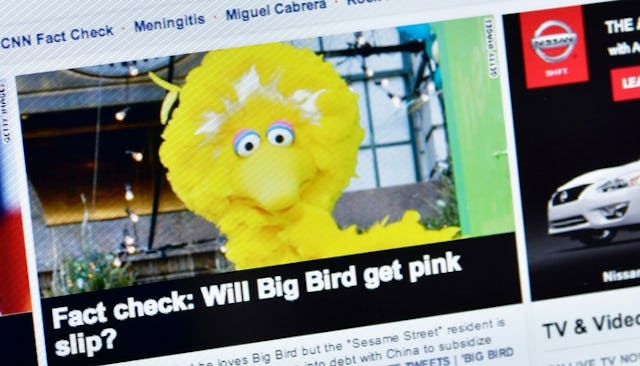We Cannot Afford To Lose NPR And PBS

When I was a little kid back in the 1980s, I remember watching my friend Big Bird try to tell the grown-ups around him about his friend Mr. Snuffleupagus. Not many people believed him, and I remember that made me sad.
But in 1985, a series of explosive news reports came out that children were being sexually abused in day care centers in the United States. Sesame Street was worried that if kids were being told that fantastical imaginations are not be believed — like when Big Bird tried to tell his grown-up friends about Snuffy — then kids may not feel empowered to tell the truth about what was actually happening to them. And so, the world was finally, properly, introduced to Mr. Snuffleupagus, in an effort to show kids that their voices matter and that trusted adults will listen to them.
This is one of countless examples that illustrate the ways in which PBS was able to reach an entire generation of kids and send a strong message that children are important, that what they think and feel and say matters. As a parent, I put a high value on that premium, and although I am willing to pay for the privilege of my children being exposed to quality television programming, the fact is that most families who live under the poverty line would not be able to afford to subsidize PBS, but they — and I — use it to teach our kids early literacy and math skills, messages of equality and empowerment, and the power of creativity.
So it is shocking to me that the Trump administration has the nerve to make any attempt to pull funding for the National Endowment for the Arts (NEA) and PBS, which fall under federal spending earmarked for cultural programming. An eye-popping report from ProPublica in 2012 revealed that “[t]his amounts to roughly .012 percent of the $3.8 trillion federal budget – or about $1.35 per person per year. (Some global perspective: elsewhere in the world, Canada spends $22.48 per citizen, Japan $58.86 per citizen, the United Kingdom $80.36 per citizen, and Denmark, $101 per citizen.)” In 2016, those numbers are largely unchanged.
The real argument that is not being made is that conservatives tend to reject the arts. They view the arts as “welfare for the elite,” but PBS? How is teaching generations of kids — and catering to children whose socioeconomic status may afford them fewer opportunities — how to count, spell, use their imaginations, articulate their feelings in appropriate ways, or break social barriers by normalizing things like autism through a wide variety of quality programming even remotely be considered elitist? What a crock.
If we set aside PBS, and zero in on National Public Radio (NPR) then we can really see where the ax to grind exists for the GOP. NPR has been in the crosshairs for conservative politicians for years because of its center-left reporting practices.
The argument is that taxpayers should not have to foot the bill for news reporting that is against their political and religious beliefs. Um, isn’t that the same thing as asking taxpayers to foot the bill for proposals to put prayer in schools and strip women of their bodily autonomy? How does that make any sense? Right-wing politicians (and voters) love to cry foul and expound on what they deem to be the expensive waste of cultural programming that in reality costs us 1/100th of 1% of the entire federal budget. Yeah, you read that right.
If the federal government really wants to cut the fat then they should take a hard look at military spending. Why is Trump looking to expand our naval fleets in a time of relative peace and when we already have the most badass military at sea in the world?
As a parent and a taxpayer, I find it appalling and hypocritical that the Trump administration has allowed funding for the NEA, which includes PBS and NPR among other culturally vital programs, to even be up for debate. Our children need access to quality programming regardless of their social class. It is fundamentally unethical to privatize all aspects of cultural programming. It’s classist, elitist, and negatively impacts already marginalized communities the most. We can’t condone this.
This article was originally published on